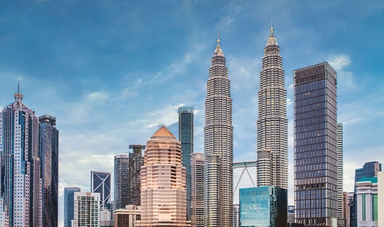Loading component...
At a glance
By Fintan Ng
Malaysia’s Budget 2022 is about bolstering economic recovery by building resilience and driving reform after the strict lockdown measures that were used to curb COVID-19.
Themed “Malaysian Family, Prosperous and Peaceful”, the spending accounts for 20.3 per cent of gross domestic product (GDP), with 233.5 billion ringgit allocated for operating expenditure, 75.6 billion ringgit for development and 23 billion ringgit to the country’s COVID-19 fund.
It is the second budget under the 12th Malaysia Plan (2021-2025).
While the 332.1 billion ringgit in spending is greater than in the 2021 budget, in percentage terms it is lower. The budget continues aid packages and economic stimulus programs to support the community and business recover from COVID-19.
The deficit projected to shrink to 6 per cent of GDP compared to 6.5 per cent in 2021.
Expansionary budget for recovery
CPA Australia’s Malaysia Country Head Priya Terumalay FCPA says the expansionary budget is the best approach as it will add momentum to economic recovery.
“The focus on job creation initiatives will support many Malaysians to transition back into the workforce while also assisting businesses to recruit the people they need to support their recovery,” Terumalay says.
“Another positive move is the focus on lifelong learning in this budget. The incentives announced should encourage more Malaysians to upskill, which should have positive impacts on their income and help businesses meet their skills needs.”
She says initiatives to empower women are particularly welcome as they will increase the number of female senior leaders in Malaysian boardrooms who can in turn be positive role models.
Grants of 230 million ringgit to support female entrepreneurs are another positive move to encourage more women to start their own business, Terumalay notes.
Low-carbon initiatives
An initiative to support Malaysia’s commitment to meeting its carbon-neutral target, the Voluntary Carbon Market, will launch as a platform for carbon credit trading between “green” asset owners and other entities transitioning to low-carbon practices.
The budget also announces a one billion ringgit fund to help small-to-medium enterprises (SMEs) adopt sustainable and low-carbon practices based on matching fund arrangements with participating financial institutions.
There is also 450 million ringgit for nature conservation, empowering communities to become biodiversity “guardians”.
CPA Australia’s Malaysia Divisional Council Deputy President Surin Segar FCPA says the initiatives are crucial to helping the country play its part in addressing climate change challenges.
“To realise Malaysia’s commitment to become a carbon-neutral nation by 2050 and to align ourselves with the UNSDG goals, everyone will need to play an active role to reduce our carbon footprint,” Segar says.
Focus on business recovery
CPA Australia’s Malaysia Tax Committee chairman Alan Chung FCPA welcomes the budget’s focus on business recovery and says the tax exemption for social enterprises for up to three years is a good step.
Chung says it also enables the local economy to regain its footing by boosting employment for vulnerable and marginalised groups.
To further help SMEs, income tax instalment payments to 30 June 2022 are deferred, while property owners who provide rental reductions to business tenants of at least 30 per cent will have a special tax deduction extended for the same period.
There is also individual tax relief and tax deduction to employers on costs associated with providing COVID-19 booster vaccines.
CPA Australia resource
Budget highlights
Prosperity tax
A one-off additional tax for companies with taxable income of over 100 million ringgit. Such companies will be subject to a 24 per cent income tax rate on taxable income of up to !00 million income, with the remaining taxable income taxed at 33 per cent for the 2022 assessment.
Tax on foreign sourced income
Malaysian residents will have income tax imposed on income derived from foreign sources and received in Malaysia from 1 January 2022.
Higher excise duty for sugary drinks

To promote a healthier lifestyle, there will be higher excise duty on sugary drink products such as pre-mixed chocolate or cocoa, malt, coffee and tea.
There is also an excise on liquid or gel products containing nicotine that are used for electronic cigarettes or other vaping devices.
Fiscal reforms
Reforms and fiscal strengthening measures will start in 2022 with the Fiscal Responsibility Act to improve governance, accountability and transparency. This includes a revenue sustainability initiative to provide equitable tax treatment in line with international regulations.
To improve fiscal discipline and transparency, a tax expenditure statement is to be published.
Business continuity support
To minimise the impact of the COVID-19 pandemic on businesses, several actions to restore business capabilities including access to financing, driving strategic investments and reviving targeted sectors will be rolled out with a 40 billion ringgit package.
This includes direct loans, financing guarantees and equity-based schemes. The aim is to benefit all businesses regardless of their size.
Strategic investment fund
A special fund will be available for strategic investments up to two billion ringgit to attract foreign multinationals, especially those that complement industry value chains and drive knowledge-based jobs creation as well as development opportunities for local SMEs.
Research funding and technology
An allocation of 423 million ringgit to intensify research and development activities, with 295 million ringgit earmarked to public universities for research and innovation as well as to encourage industry collaborations.
An innovation hub located in Technology Park Malaysia will be developed to serve as a one-stop centre for the development of emerging technology clusters such as drones, robotics and autonomous vehicles.
Tourism initiatives
A total of 1.6 billion ringgit to drive economic recovery in the tourism sector, which has been severely affected by the pandemic. Initiatives include wage subsidy, financing, special assistance and maintenance of tourism infrastructure.
Rural infrastructure
More than 2.5 billion ringgit is allocated for rural infrastructure, of which 1.5 billion ringgit is for rural and inter-village road projects. The majority of the fund is earmarked for Sabah and Sarawak.
Restoring lives and livelihoods
Initiatives to provide targeted cash assistance, enhance education and public health as well as job creation will be continued.
National Higher Education Fund
Discounts are to be given to borrowers to facilitate the loan repayment process based on the amount outstanding.

